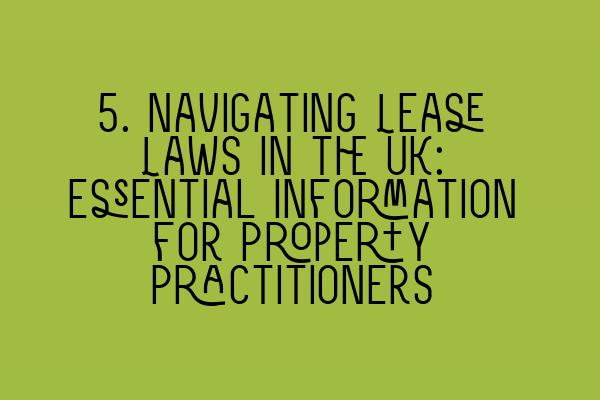Navigating Lease Laws in the UK: Essential Information for Property Practitioners
As a property practitioner in the UK, understanding lease laws is crucial to effectively represent clients and ensure compliance with legal requirements. Navigating the complexities of lease laws can be challenging, but with the right knowledge and guidance, you can confidently handle lease transactions and resolve any issues that may arise.
1. Understanding Lease Basics
Before delving into the intricacies of lease laws, it’s important to have a solid understanding of lease basics. A lease is a contractual arrangement between a landlord (lessor) and a tenant (lessee) that grants the tenant exclusive possession of a property for a specific period of time, usually in exchange for rent.
Lease terms can vary widely, from short-term leases for residential properties to long-term leases for commercial properties. It’s crucial to review and negotiate lease terms carefully to protect your client’s interests and ensure a fair and reasonable agreement.
For a comprehensive overview of lease basics, check out our SQE 1 Practice Exam Questions.
2. Key Lease Provisions
a) Rent and Rent Review
Rent is a fundamental element of a lease agreement. It’s important to clearly outline the rent amount, frequency of rent payments, and any mechanisms for rent review. Rent review provisions allow for periodic adjustments to the rent, ensuring that it remains fair and reflective of current market conditions.
To understand the intricacies of rent provisions, take a look at our SQE 1 Practice Mocks FLK1 FLK2.
b) Repair and Maintenance Obligations
Lease agreements typically include provisions detailing the repair and maintenance obligations of both the landlord and the tenant. Ensuring that these obligations are clearly defined is essential to avoid disputes and costly repairs in the future.
Our SQE 2 Preparation Courses provide in-depth guidance on handling repair and maintenance provisions within lease agreements.
c) Assignment and Subletting
Lease agreements often include provisions regarding the assignment and subletting of the property. These provisions define the tenant’s rights to transfer their lease to another party or sublet the property to a third party. It’s important to carefully review and negotiate these provisions to protect your client’s interests.
For comprehensive preparation on handling assignment and subletting provisions, refer to our SQE 1 Preparation Courses.
d) Termination and Renewal
Understanding the termination and renewal provisions of a lease agreement is crucial for both landlords and tenants. These provisions dictate the process and notice requirements for terminating a lease, as well as the options for lease renewal.
Stay up-to-date with the latest SRA SQE exam dates by visiting our SRA SQE Exam Dates page for relevant information.
3. Dispute Resolution
Despite careful negotiation and drafting, disputes regarding lease agreements can still arise. It’s important to be equipped with the knowledge and skills to effectively resolve these disputes and minimize any potential negative impact on your client.
Our team at SQE Property Law & Land Law has extensive experience in lease dispute resolution and can assist you in achieving the best possible outcome for your client.
4. Stay Updated with the Latest Lease Laws
Lease laws are constantly evolving, and it’s crucial to stay updated with the latest legal developments. Engaging in ongoing professional development, attending relevant seminars and webinars, and regularly reviewing lease case law can significantly enhance your expertise in this field.
Additionally, consider subscribing to our newsletter to receive regular updates and insights on lease laws and other property-related topics.
5. Seeking Expert Advice
While it’s important to have a strong understanding of lease laws as a property practitioner, it’s also essential to recognize the limits of your expertise. When faced with complex legal issues or unfamiliar lease provisions, seeking expert advice from specialist solicitors can provide invaluable guidance and ensure the best possible outcome for your clients.
Contact SQE Property Law & Land Law today to discuss your lease-related queries and benefit from our extensive knowledge and experience in this field.
Disclaimer: The information provided in this article is for general informational purposes only and should not be considered legal advice. Always consult with a qualified solicitor for advice tailored to your specific situation.
